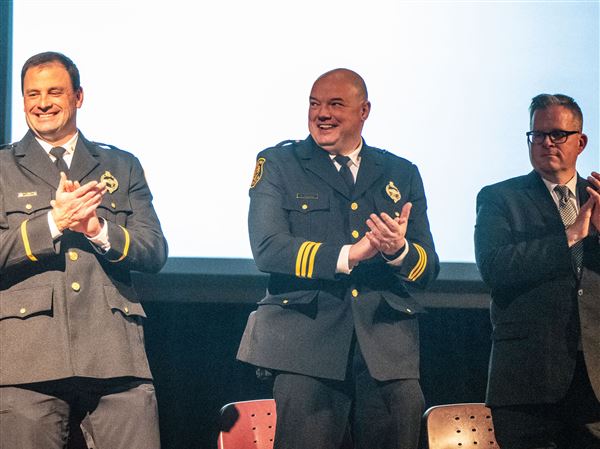First in an occasional series.
Four bright-eyed beagle puppies frolicked and romped, white-tipped tails held high and wagging. The dogs ran up to seated strangers at the Beaver County Humane Society and put their paws on laps, seeking attention and petting.
The tails wagged faster when their silky ears were rubbed.
All of this is what one would expect, but the 8-month-old males aren’t “regular” puppies. They and 3,096 other beagles — puppies and adults as old as 7 — had lived at the Envigo RMS facility in Cumberland, Va. They were bred to be sold to laboratories that use animals for experiments.
Federal inspectors found more than 70 Animal Welfare Act violations, including dog food laced with maggots, mold and feces, and dogs being killed instead of getting veterinary care.
The facility was shut down and in July a federal judge authorized the transfer of 4,000 beagles to the Humane Society of the United States. That national organization distributed the dogs to shelters and rescues across the country.
Twenty-five 8-month-old male beagles arrived in Pittsburgh on Aug. 8. Four pups each went to humane societies in Beaver, Butler and Washington counties; Humane Animal Rescue of Pittsburgh; and Heart of Glass Animal Rescue in the South Side of Pittsburgh. Animal Friends in Ohio Township took in five.
The black, brown and white dogs had little, if any, exposure to a kind word or affection from people. They never had stepped paws on grass. They never had toys to play with.
They didn’t even have names. Instead, they had numbers tattooed on the inside of their ears.
When they arrived at the shelter in Center, Beaver County, BCHS kennel and operations manager Liesl Wiesen gave them names: Yeager, Remington, Hansel and Flash.
When local television news cameras documented their arrival in Pittsburgh, the puppies looked shell-shocked. Though shy and scared, they never growled or snapped, and quickly warmed to the kindness of strangers. They seemed to know each other, and enjoyed romping and playing together.
Each of the rescue organizations was swamped with calls and emails from hundreds of people who wanted to adopt them.
Though sweet and pretty, the beagles didn't know how to do any of the things that 8-month-old puppies should know.
They didn't know how to walk on a leash. They had never been “housebroken” and didn’t know they should pee and poop outside. They didn’t know basic commands such as “come” and “sit” and they wouldn’t take food or treats out of the hands of people.
Shelter and rescue employees and volunteers have worked with dogs and puppies that came from large commercial breeding facilities and from abuse/neglect situations, including hoarder houses. In those cases the canines were afraid of people, did not initially respond to kindness and petting and were so shut down emotionally that they didn’t ever wag their tails. In those cases, it took months or even years of patience, kindness and training to rehabilitate them into happy pets. The dogs are often skinny and in poor health.
The Virginia puppies are the right weight, at 25 to 30 pounds. Their coats are shiny and they have no fleas or intestinal parasites. They all passed their veterinary checks with flying colors. But they all had to be neutered or spayed.
Yeager and Remington went home with Sara Lytle, who has provided temporary foster homes for 50 shelter dogs in the last six years. The other two puppies also went to fosters. Their development, socialization and training proceeded mere rapidly than expected, and in less than six weeks all were in their “forever” homes.
Hearts of Glass
Casey Clark of Springdale grew up with beagles, and has owned and loved beagles her entire life. When she heard that 4,000 beagles had been released from a breeding and research laboratory in Virginia, she knew she had to adopt one.
“I am adamantly opposed to using animals in research and I heard about these dogs from the Beagle Freedom Project,” she said.
She’s a member of the California-based nonprofit with a mission to stop tests on animals, especially beagles, commonly bred because they are gentle, non-aggressive, easy to handle and don’t take up too much space in kennels or cages.
Since 2010 the Beagle Freedom Project has found homes for more than 3,000 animals used in research, including some cats, rats and mice. One of the lab dogs they took in was adopted by Meghan Markle, the American-born actress who lives in the Los Angles area with her prince, Harry, who is the son of Diana, Princess of Wales.
Clark adopted a beagle from Heart of Glass, and brought her dog back to a reunion at the rescue’s South Side facility. The dog, Dylan, wore her very first collar with an engraved name tag, as she romped with fellow rescue dogs named Charlie, Natalie and Alex.
“Charlie breaks my heart,” said Nicola Hill-Solomon, who founded Heart of Glass rescue late last year. “The vet thinks he is about 7 years old, so he was in that place the longest.”
Charlie shies away from people. When approaching people who call him, he walks slowly, lowers his belly and drops his head, avoiding eye contact. But he accepts being petted and never growls or snaps or bites.
But Charlie loves Dylan, Natalie and Alex.
“We call them Charlie’s Angels,” Hill-Solomon said.
Charlie follows them around, sniffing and licking and humping them.
“Well, that was his job all these years, but now he is retired,” Hill-Solomon said. “He’s being discouraged from doing that and they’re all spayed and neutered now, so ...”
The three girls, who are around 5 years old, seem to enjoy the attention of Charlie, doing nothing to discourage his behavior. Their job, for many years, was to produce multiple litters of puppies.
The girls, though not quite as exuberant as the puppies in the Beaver County shelter, quickly warm up to strangers and visitors.
“They were all shut down when they came here,” but quickly became social and accepting, Hill-Solomon said.
In just one week Dylan quickly bonded with Clark; her children, Trevor, 13, and Shane, 10, and the family’s two other dogs — shepherd Kingsley, 8, and coon hound Alleigh, 6. Clark had two elderly beagles who died earlier this year, so she was happy to get another beagle.
Dylan’s house training is going well. “We have a doggy door and she figured that out quickly. I work from home as a copy editor,” Clark said, so she’s able to supervise and train the new dog.
“I was encouraged to get Dylan a crate, which I was reluctant to do,” she said. “But she loves sleeping in it. I guess it’s her safe haven.”
Hill-Solomon was expecting to get more beagles to add to her roster of adoptable dogs, which currently includes several pit bulls. Earlier this year she took in a dog from the Korean meat market, and found him a good home. She regularly takes in dogs from a Humane Society in St. Thomas.
She worked for a number of years at shelters in the Philadelphia area, where she frequently partnered with HSUS. When she moved back to Pittsburgh, she planned to start a rescue with her father, Edwin Bruce Hill III.
“We lost him to COVID, but he left me a bequest so I am able to do this,” she said. His portrait, drawn by an artist friend, hangs in the Heart of Glass office.
First Published: October 31, 2022, 10:00 a.m.
Updated: October 31, 2022, 5:23 p.m.





















